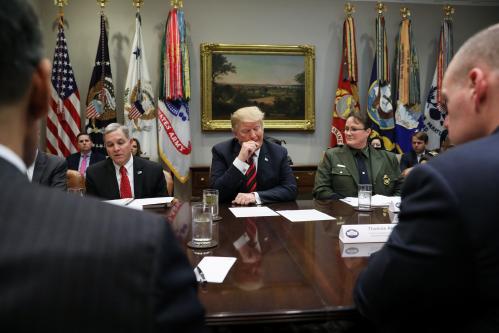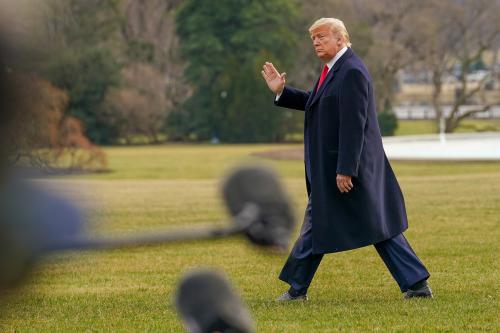Impeachment has dogged President Trump since the very earliest days of his presidency. Less than six months into his first term, in a move one of his former aides called the biggest self-inflicted wound of all time, he fired the director of the FBI in a botched attempt to call off the investigation into Russian interference in the 2016 election. Since then, the issue has come and gone depending on events. Many assumed that the Mueller Report would provide the evidence needed to convince Congress to move ahead with impeachment, but it did not. Ill-conceived campaigns for impeachment ended up politicizing the issue, talking to the converted and failing to move congressional leaders. And absent any sign that at least some Republican senators would vote to convict Trump, the House leadership has been reluctant to give the go-ahead.
But this week things changed. Speaker Pelosi announced that the House of Representatives would begin impeachment proceedings.
What happened to break the logjam? First, a whistleblower revealed that in a conversation with Ukrainian President Zelensky the president allegedly held up $391 million in aid appropriated for Ukraine’s military defense against Russia. This move was an effort to push for the Ukranian president’s promise to investigate alleged corruption by Democratic presidential hopeful Joe Biden and his son Hunter. The aid to Ukraine was held up even after other aid that the Mr. Trump had called “wasteful” was released. As Republican senators and government officials grew concerned about the delay, the Ukranian aid remained on hold. It was finally released two days before news of the phone call between Trump and Zelensky hit the press. The sheer audacity of using properly appropriated money and the formal powers of the presidency for personal political purposes shook Washington. It made Richard Nixon’s break-in at the Democratic National headquarters at the Watergate look like child’s play.
Second, amidst all the usual demands for investigations, a group of Democratic members of Congress wrote a letter to the Washington Post saying, “These allegations are stunning, both in the national security threat they pose and the potential corruption they represent.” They went on to say, “If these allegations are true, we believe these actions represent an impeachable offense.”
This letter, more than any other previous chapter in the Trump impeachment story, hit Washington like a bomb because of who these members of Congress are. Gil Cisneros (Calif.-39) is a Navy Veteran who went to college on an ROTC scholarship. Jason Crow (Colo.-6) is an Army veteran who served in Iraq and Afghanistan. Chrissy Houlahan (Penn.-6) is another ROTC scholarship graduate who served in the Air Force. Elaine Luria (Va.-2) served two decades in the Navy where she was deployed on combatant ships from the Middle East to the Pacific and where she commanded 400 sailors. Mikie Sherrill (N.J.-11) is a graduate of the Naval Academy and a pilot who spent 10 years on active duty, including flying the Sea King helicopter. Elissa Slotkin (Mich.-8) joined the CIA after the 9/11 terrorist attacks as a Middle East analyst and did three tours in Iraq as a militia expert. Abigail Spanberger (Va.-7) also served in the CIA at home and overseas, gathering information on terrorism and nuclear proliferation.
No one in this group is an egocentric billionaire advocating impeachment as a way to run for the Democratic nomination for president. No one in this group is a socialist. No one in this group is from a far-left, safe Democratic district where the voters think cutting health care subsidies is grounds for impeachment. In fact, four of these districts lean Republican, two are slightly Democratic and one is dead-even between Democrats and Republicans according to the Partisan Voting Index. And everyone in this group has done something this president never has: served their country in a military or intelligence capacity.
What these five women and two men have done is put their political futures on the line because they believe that President Trump has committed an offense that is truly impeachable. Assuming this is not derailed somehow, the House will pass articles of impeachment and the action will move to the Senate, where the search will be on for 20 more patriots. Since conviction requires 67 votes in the Senate, 20 Republican senators will have to vote to convict—assuming that all the Democrats vote to convict.
Last week the possibility that any Republican senator would vote to convict Trump was nothing but a pipedream. But within minutes of Speaker Pelosi’s remarks the Senate passed a measure urging release of the full whistleblower complaint. Under Senate rules all it took was one senator to block the resolution and none did.
And now the wait for 20 Republican senators.
This work is licensed under the Creative Commons Attribution-NonCommerical-NoDerivatives 4.0 International License. To view a copy of the license, visit https://creativecommons.org/licenses/by-nc-nd/4.0/.







Commentary
Impeachment: Is the dam finally breaking?
September 24, 2019